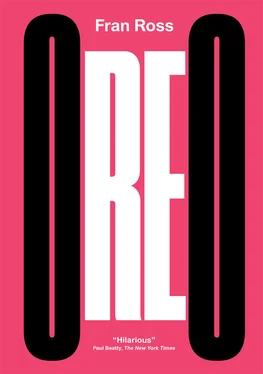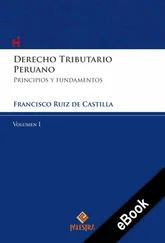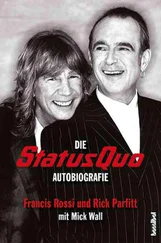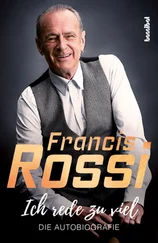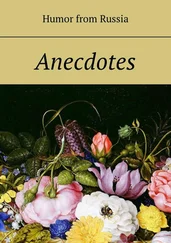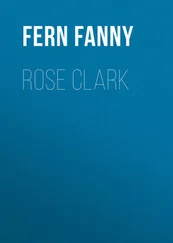Oreo answered, “Suppose you were sliding on a banister and it turned into a razor blade.”
Jimmie C. fainted.
Oreo was very sorry when that happened. She did not really want to be mean to her sweet little brother, but sometimes it was a case of simple justice. When Jimmie C. asked her whether there was such a thing as an emergency semicolon (of course!), she answered, “Suppose you were putting Visine in your eyes and it turned into sulfuric acid.”
Jimmie C. fainted.
Oreo resolved to give up her “suppose” game until she found a less deserving person to use it on.
One day Jimmie C. came to Oreo and said gently, “Suffer the little children to come unto me.” This was his derivative way of asking her to gather all the kids on the block for a special outing. Soon there were eighteen children of eighteen colors, sizes, shapes, and ages milling about in the Clarks’ back yard. (The eighty-one-year-old qualified on the grounds of demonstrable dotage.) Jimmie C. explained to them that his grandmother was at that moment making a six-foot-long hoagie à la Louise that could be cut into as many sections as there were children and that he knew of a great place to have a picnic.
All the children jumped up and down shouting that they did not want to go. Oreo gave them a threatening look, and they gave in.
Jimmie C. ran into the house and came back with a plastic bucket. He went to the side of the house and turned on the garden tap. And, lo, the bucket did fill up with foamy orange Kool-Aid.
The children gasped. Petey Brooks, the eighty-one-year-old, said wistfully, “In my yard it always comes out water.” All assembled thought they had witnessed a miracle.
But honest Jimmie C. laughed his tinkly, musical laugh and sang, “The Kool-Aid was already in the bucket.” Oreo thought her brother was a prize scrock for letting the kids know this, but she kept her peace.
And so they set off. All the children took turns carrying the Kool-Aid bucket and slopping it all over their sneakers and jeans. They had been walking for about fifteen minutes when Petey Brooks, who was in bad shape for his age, said diplomatically, “Where the fuck is this park?”
“You’ll see, you’ll see,” said Jimmie C. “It’s near nobby.”
“I don’t remember any park near here,” said Petey.
And Jimmie C. said unto them, “O ye of little faith, it’s just around the grabus.”
They turned the grabus, or corner, onto another street. A plain street. No park. “So where’s the park?” Oreo asked.
Jimmie C. looked stunned. “It should be right nobby.”
But it wasn’t.
“I’m tired,” said Petey.
“So am I,” said seventeen other voices.
Oreo took over. “Let’s sit down here.” They ranged out over the steps of a row of row houses. Oreo opened her paper bag and took out her section (the best) of the hoagie à la Louise. She dipped her paper cup into the half inch of Kool-Aid that had not spilled on the way. Everyone else did the same. Then they stared at Jimmie C.
He smiled sweetly at them. Finally, when they were almost through chewing and swallowing and staring, a glow transfigured Jimmie C.’s face. “I know what!” he exclaimed. He chuckled musically to himself.
“What, fool? Speak up,” said Oreo.
Jimmie C. ascended to the top step, stretched out his arms to the multitude, and sang, “I dreamt the park!”
Oreo looked at him in disgust, then she had to turn and protect him from thirty-six fists, handicapped though they were by the remnants of the hoagie à la Louise they were still clutching. Jimmie C. thoughtfully advised them to hold on to this sustenance, for they would need nourishment on the long journey back home.
Oreo expressed the sentiments of the whole group when she looked at her little brother and said slowly, “You are a yold . You and your jive dream parks.”
Oreo’s tutors
Oreo did not go to school. With the income from James’s back-list, Louise’s numbers, and Helen’s piano playing, the family was able to hire special tutors for Oreo. Professor Lindau, renowned linguist and blood donor, was her English tutor. He spoke in roots. He would come in after his daily blood-bank appointment mumbling, “How are you this morning, my vein, my blood?” which was not a comment on his most recent donation but a greeting to Oreo. He would then toss Oreo a volume of one of his two idols, Partridge or Onions, and Oreo would have to figure out what he meant by consulting the book. Thus his greeting was a simple “How are you this morning, macushla?” Professor Lindau talked so much about Partridge and Onions that Louise was inspired to invent perdrix en poirier à l’oignon .
One day. Professor Lindau came in, in a bad mood. He ranted fitfully about his girlfriend. “That wedge!” he shouted. “What can one do with a wedge like that?” he asked rhetorically.
Oreo was puzzled, so the professor tossed her the desk copy of Partridge. After following a trail of false roots and camouflaged cognates, she came to Partridge’s assertion that cunt (or, as Partridge put it, “ c*nt ”) derived from the Latin cunnus , which was related to cuneus , or “wedge.” Eric went on to say that the word had been considered obscene since about 1700, adding that “the dramatist Fletcher, who was no prude, went no further than ‘They write sunt with a C, which is abominable’, in The Spanish Curate . Had the late Sir James Murray courageously included the word, and spelt it in full, in the great O.E.D., the situation would be different;… (Yet the O.E.D. gave prick : why this further injustice to women?)… (It is somewhat less international than f**k, q.v.)”
Oreo fell off her chair laughing at this witty entry in Partridge. When she got herself together, she shook her head. Her sprachgefühl told her that Eric was stretching a point (or, rather, a wedge) and that the professor was perpetuating Partridge’s error by persisting in this pie-eyed usage. She had never been misled by her sprachgefühl , and as she thumbed through a later edition of Partridge, she found that that worthy had corrected himself in a supplement: “(p. 198) cannot be from the L. word but is certainly cognate with O.E. cwithe , ‘the womb’ (with a Gothic parallel); cf. mod. English come , ex O.E. cweman . The ~nt , which is difficult to explain, was already present in O.E. kunte . The radical would seem to be cu (in O.E. cwe ), which app. = quintessential physical femineity… and partly explains why, in India, the cow is a sacred animal.”
Oreo fell off her chair laughing at the part about the cow. She was, after all, just a child in her mid-units. Then she pointed out the passage in the supplement to the professor.
“I know, I know,” he said, dismissing her quibble. “But I like the idea of wedge. It whips.” When Oreo looked puzzled again, he tossed her volume 12 of the O.E.D.
Oreo became adept at instantaneous translations of the professor’s rhizomorphs. “Mr. Benton is worn out by childbearing. Of course, his paper was an ill-starred bottle. I don’t wonder he threatened to sprinkle himself with sacrificial meal.” “You mean,” said Oreo, “that Benton is effete, his paper was a disaster, a fiasco, and he wanted to immolate himself.” The professor was impressed but not struck dumb. “I am phonofounded,” he said logodaedalyly.
Once in an adjective-adverb drill, Oreo wrote: “He felt badly.” The professor was furious and viciously crossed out the ly . He was ashamed of Oreo.
Oreo looked him dead in the eye and said, “I am writing a story about a repentant but recidivous rapist. In the story, this repentant rapist catches his hand in a wringer. Therefore, when he goes out, recidivously, to rape, he feels both bad and badly.” The professor kissed Oreo on both cheeks.
Читать дальше
